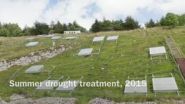(Press-News.org) Some children react more strongly to negative experiences than others. Researchers from the Norwegian University of Science and Technology (NTNU) have found a link between aggression and variants of a particular gene.
But children who react most aggressively also tend to respond more strongly to good experiences, the Norwegian researchers found. These children's mood swings have deeper valleys, but also greater peaks.
Aggression is common in young children. Aggressive behaviour increases until children are around 4 years old, and then gradually subsides.
Research has shown that children who struggle with aggressive behaviour when they are young often carry these problems into puberty.
But aggression in children is not necessarily all bad. It may be a logical response to external factors, for example if children are exposed to violence and abuse.
Can be useful
Not only can aggression be the right response to an external influence, it may also be helpful to have more aggressive individuals among us.
In a stable situation with adequate resources, people with a stable temperament have an advantage. Individuals with a more variable disposition may overreact to even minor changes, which can be an evolutionary disadvantage.
But as soon as conditions change, such as an increase in the struggle for resources, those who react more strongly to external influences have the advantage.
According to some American scientists, probably the best scenario for a population is to have a broad mix of people with varying tendencies to react aggressively.
The Wall Street Journal highlighted Norwegian research results in a report that discussed aggression in light of evolutionary theory.
Gene connection found
Aggression is the result of both genetics and environment, making it interesting to examine how genes and environment interact. How do people with different genotypes react to different environmental conditions?
In a group of children, some will be more aggressive than others. Some will react strongly to stress, while others maintain their equilibrium in almost any situation. The child's genes can at least partly explain this phenomenon.
The Norwegian research group is led by Beate W. Hygen of NTNU's Department of Psychology and NTNU Social Research. Researchers found a correlation between aggression and the particular gene variants present in children when they had experienced or not experienced serious life events.
This gene is involved in dopamine breakdown in the brain.
This finding was in itself a confirmation of earlier studies, but the Norwegian researchers also found that children who were more aggressive when they were exposed to stress, were the least aggressive when they were not exposed to stress.
This indicated that they had a tendency to greater variation in behaviour in both directions than their less aggressive counterparts.
For better or for worse
These research findings help to substantiate the theory, referred to as "differential susceptibility," that some individuals are more susceptible to environmental conditions, for better or for worse, partly because of their genotype.
Previously, scientists thought that some children are more vulnerable than others when experiencing trauma or stress, and that these vulnerable children function on an equal footing with others in positive environmental conditions.
Differential susceptibility theory argues that those individuals most affected by adverse conditions may also benefit most from positive conditions.
That is, these individuals function better under positive environmental influences than those who are not as susceptible to environmental conditions.
The results of the Norwegian study were recently published in Developmental Psychology.
The basis of the Norwegian research is the study Tidlig Trygg i Trondheim, in which about 1,000 children, their parents and teachers participated.
INFORMATION:
Reference: Child exposure to serious life events, COMT, and aggression: Testing differential susceptibility theory. Hygen, Beate Wold; Belsky, Jay; Stenseng, Frode; Lydersen, Stian; Guzey, Ismail Cuneyt; Wichstrøm, Lars
Developmental Psychology, Vol 51(8), Aug 2015, 1098-1104.
http://dx.doi.org/10.1037/dev0000020
PROVIDENCE, R.I. [Brown University] -- A study provides multiple lines of new evidence that pigments and the microbodies that produce them can remain evident in a dinosaur fossil. In the journal Scientific Reports, an international team of paleontologists correlates the distinct chemical signature of animal pigment with physical evidence of melanosome organelles in the fossilized feathers of Anchiornis huxleyi, a bird-like dinosaur that died about 150 million years ago in China.
The idea that melanosomes, which produce melanin pigment, are preserved in fossils has been ...
Physicists have found a radical new way confine electromagnetic energy without it leaking away, akin to throwing a pebble into a pond with no splash.
The theory could have broad ranging applications from explaining dark matter to combating energy losses in future technologies.
However, it appears to contradict a fundamental tenet of electrodynamics, that accelerated charges create electromagnetic radiation, said lead researcher Dr Andrey Miroshnichenko from The Australian National University (ANU).
"This problem has puzzled many people. It took us a year to get this ...
COLUMBUS, Ohio - Many clinical trials use genome sequencing to learn which gene mutations are present in a patient's tumor cells. The question is important because targeting the right mutations with the right drugs can stop cancer in its tracks. But it can be difficult to determine whether there is evidence in the medical literature that particular mutations might drive cancer growth and could be targeted by therapy, and which mutations are of no consequence.
To help molecular pathologists, laboratory directors, bioinformaticians and oncologists identify key mutations ...
A study by the University of Liverpool has found that the genetic diversity of wild plant species could be altered rapidly by anthropogenic climate change.
Scientists studied the genetic responses of different wild plant species, located in a natural grassland ecosystem near Buxton, to a variety of simulated climate change treatments--including drought, watering, and warming--over a 15-year period.
Analysis of DNA markers in the plants revealed that the climate change treatments had altered the genetic composition of the plant populations. The results also indicated a ...
Twitter offers a public platform for people to post and share all sorts of content, from the serious to the ridiculous. While people tend to share political information with those who have similar ideological preferences, new research from NYU's Social Media and Political Participation Lab demonstrates that Twitter is more than just an "echo chamber."
The research is published in Psychological Science, a journal of the Association for Psychological Science.
"Platforms like Twitter or Facebook are creating unprecedented opportunities for citizens to communicate with ...
Philadelphia, PA, August 27, 2015 - About 3% of colorectal cancers are due to Lynch syndrome, an inherited cancer susceptibility syndrome that predisposes individuals to various cancers. Close blood relatives of patients with Lynch syndrome have a 50% chance of inheritance. The role that PMS2 genetic mutations play in Lynch syndrome has been underestimated in part due to technological limitations. A new study in the Journal of Molecular Diagnostics describes a multi-method strategy to overcome existing technological limitations by more accurately identifying PMS2 gene mutations, ...
Needham, MA.-JBJS Case Connector, an online case report journal published by The Journal of Bone and Joint Surgery, has issued a "Watch" regarding relatively rare but potentially catastrophic complications from failure of modular head-neck prostheses commonly used in hip-replacement surgery.
The arthroplasty community currently feels that the advantages gained from modularity in hip implants outweigh the risks, but this Watch raises that risk-benefit question again. The decision to issue the Watch was prompted by a case report by Swann et al. in the August 26, 2015 JBJS ...
Analysis of blood samples from more than 5,000 people suggests that a more sensitive version of a blood test long used to verify heart muscle damage from heart attacks could also identify people on their way to developing hypertension well before the so-called silent killer shows up on a blood pressure machine.
Results of the federally funded study, led by Johns Hopkins investigators, found that people with subtle elevations in cardiac troponin T -- at levels well below the ranges detectable on the standard version of this "heart attack" test -- were more likely to be ...
Dogs get cancer, too. And they have even fewer treatment options than their human owners do. But an article in Chemical & Engineering News (C&EN), the weekly newsmagazine of the American Chemical Society, offers a glimmer of hope. It explores how clinical trials on man's best friend could be a win-win for both dogs and people.
Judith Lavelle, an intern at C&EN, notes that only a small percentage of potential human cancer drugs get approved by the U.S. Food and Drug Administration. Many of them fail when tested in people in clinical trials. A major reason for this late ...
GeoSpace
Terraced craters: Windows into Mars' icy past
Just beneath Mars' dirt surface, or regolith, researchers found an enormous slab of water ice, measuring 40 meters (130 feet) thick, and covering an area equivalent to that of California and Texas combined, according to a new study published today in Geophysical Research Letters.
Eos.org
What lies deep in the mantle below?
For decades, scientists have probed Earth's remote mantle by analyzing how seismic waves of distant earthquakes pass through it. But we are still challenged by the technique's limitations.
New ...


